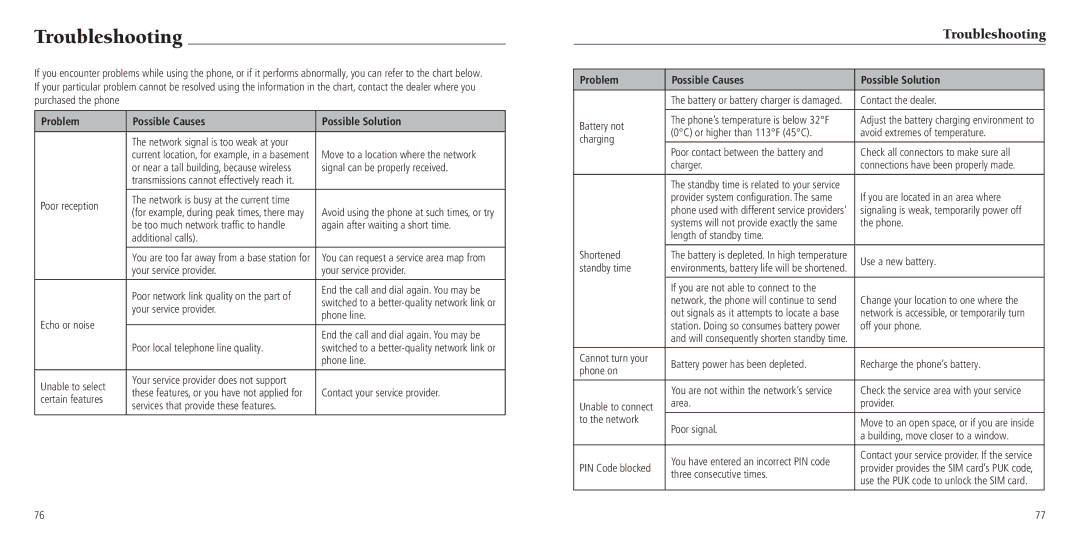
Troubleshooting
If you encounter problems while using the phone, or if it performs abnormally, you can refer to the chart below. If your particular problem cannot be resolved using the information in the chart, contact the dealer where you purchased the phone
Problem | Possible Causes | Possible Solution | |
|
|
| |
| The network signal is too weak at your |
| |
| current location, for example, in a basement | Move to a location where the network | |
| or near a tall building, because wireless | signal can be properly received. | |
| transmissions cannot effectively reach it. |
| |
|
|
| |
Poor reception | The network is busy at the current time |
| |
(for example, during peak times, there may | Avoid using the phone at such times, or try | ||
| |||
| be too much network traffic to handle | again after waiting a short time. | |
| additional calls). |
| |
|
|
| |
| You are too far away from a base station for | You can request a service area map from | |
| your service provider. | your service provider. | |
|
|
| |
| Poor network link quality on the part of | End the call and dial again. You may be | |
| switched to a | ||
| your service provider. | ||
| phone line. | ||
Echo or noise |
| ||
|
| ||
| End the call and dial again. You may be | ||
|
| ||
| Poor local telephone line quality. | switched to a | |
|
| phone line. | |
|
|
| |
Unable to select | Your service provider does not support |
| |
these features, or you have not applied for | Contact your service provider. | ||
certain features | |||
services that provide these features. |
| ||
|
| ||
|
|
|
76
|
| Troubleshooting | |
|
|
| |
Problem | Possible Causes | Possible Solution | |
|
|
| |
| The battery or battery charger is damaged. | Contact the dealer. | |
|
|
| |
Battery not | The phone’s temperature is below 32°F | Adjust the battery charging environment to | |
(0°C) or higher than 113°F (45°C). | avoid extremes of temperature. | ||
charging | |||
|
| ||
Poor contact between the battery and | Check all connectors to make sure all | ||
| |||
| charger. | connections have been properly made. | |
|
|
| |
| The standby time is related to your service |
| |
| provider system configuration. The same | If you are located in an area where | |
| phone used with different service providers’ | signaling is weak, temporarily power off | |
| systems will not provide exactly the same | the phone. | |
| length of standby time. |
| |
|
|
| |
Shortened | The battery is depleted. In high temperature | Use a new battery. | |
standby time | environments, battery life will be shortened. | ||
| |||
|
|
| |
| If you are not able to connect to the |
| |
| network, the phone will continue to send | Change your location to one where the | |
| out signals as it attempts to locate a base | network is accessible, or temporarily turn | |
| station. Doing so consumes battery power | off your phone. | |
| and will consequently shorten standby time. |
| |
|
|
| |
Cannot turn your | Battery power has been depleted. | Recharge the phone’s battery. | |
phone on | |||
|
| ||
|
|
| |
| You are not within the network’s service | Check the service area with your service | |
Unable to connect | area. | provider. | |
|
| ||
to the network | Poor signal. | Move to an open space, or if you are inside | |
| |||
| a building, move closer to a window. | ||
|
| ||
|
|
| |
| You have entered an incorrect PIN code | Contact your service provider. If the service | |
PIN Code blocked | provider provides the SIM card’s PUK code, | ||
three consecutive times. | |||
| use the PUK code to unlock the SIM card. | ||
|
| ||
|
|
| |
|
| 77 |
